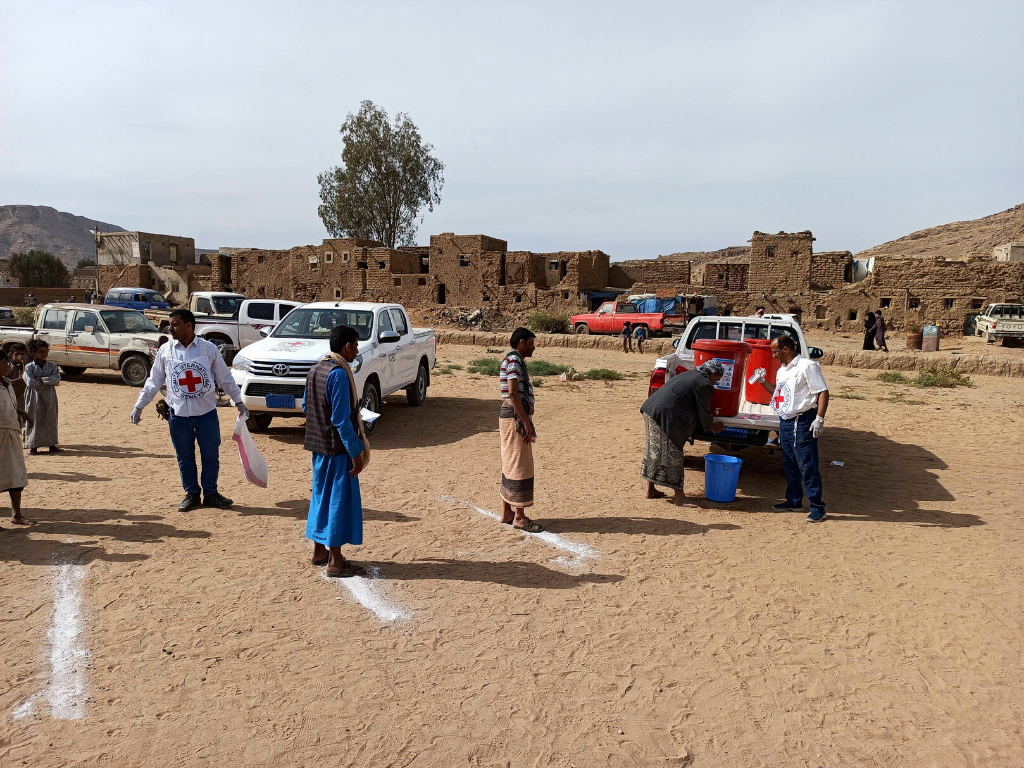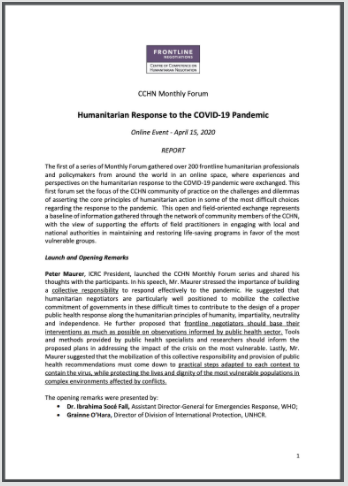
Beneficiaries wash their hands before an ICRC food distribution. (Photo: Saif Aloliby/ICRC)
The impact of COVID-19 on humanitarian responses is massive and varied in different regions and contexts. During the first CCHN Monthly Forum that took place on 15 April 2020, the CCHN brought together field practitioners, policymakers, experts and government representatives to discuss the latest developments affecting the international humanitarian response.
With over 250 attendees from different organizations and regions, this field-oriented forum aimed to capture insights from members of the CCHN’s community of practice, supporting efforts of field practitioners who engage with local and national authorities to maintain the delivery of assistance and life-saving programs for the most vulnerable groups.
Opportunity for Humanitarians to Exchange in the COVID-19 Context
At the first CCHN Monthly Forum, senior leadership of the International Committee of the Red Cross and the United Nations High Commissioner for Refugees, both Strategic Partners of the CCHN, presented their keynotes in the first plenary session.
The forum was launched by Peter Maurer, the President of the ICRC. “It’s important of building a collective responsibility to respond effectively to the pandemic. He suggested that humanitarian negotiators are particularly well-positioned to mobilize the collective commitment of governments in these difficult times to contribute to the design of a proper public health response along with the humanitarian principles of humanity, impartiality, neutrality and independence.”
His introduction was then followed by Dr. Ibrahima Socé Fall, Assistant Director-General for Emergencies Response, World Health Organisation and Graine O’hara, Director of Division of International Protection, UNHCR.
Dr. Ibrahima Socé Fall emphasized, “WHO support measures to countries through the Global Humanitarian Response Plan and stressed the importance of a collective response. Negotiation tools and methods are ever more relevant for frontline humanitarians in order to access and provide health services to populations in conflict-affected areas. “
While Graine O’hara shared, “There’s a need of advocating and negotiating for the inclusion of people on the move, specifically refugees, displaced populations and migrants in the public health plans of affected countries.”
Presenting Regional Challenges and Dilemmas
After the plenary session, the attendees were divided into the regional working groups based on their preferences and expertise. The CCHN Negotiation Support Specialists for Africa, Asia, the Middle East, and Latin America presented a summary of the CCHN survey on the topic and the findings during the regional peer discussions which had been conducted prior to the forum. Some members of the CCHN community of practice took this opportunity to share experiences from their contexts. They also engaged with other attendees and reflected on recurrent challenges and dilemmas linked to the COVID-19 crisis.
“Brainstorming with other humanitarian practitioners across different sectors is essential and the CCHN Monthly Forum provides a safe space to discuss and work through some of these dilemmas and challenges we face and hopefully develop innovative solutions to address them,” Protection and Gender-Based Violence (GBV) Specialist and Programme Manager, IOM.
Interviewing the Experts
The attendees were later invited back to the plenary session where the CCHN Negotiation Support Specialists highlighted some findings based on the exchanges in the regional working groups. In the last session, Claude Bruderlein interviewed experts from the diplomatic and academic sectors: Dr. Sinead Walsh, EU Ambassador to South Sudan, co-author of “Getting to Zero: A Doctor and A Diplomat on the Ebola Frontline” and Dr. David Fairman, Managing Director at the Consensus Building Institute and Associate Director of the MIT-Harvard Public Disputes Program, co-author of “Negotiating Public Health in a Globalized World: Global Health Diplomacy in Action”.
After the interview, the attendees could ask their questions directly or write them in the chat which were then answered by the speakers or other attendees who had similar ideas and experiences.
The next CCHN Monthly Forum in May will continue the discussion on the humanitarian response to the COVID-19 pandemic with a special focus on the needs of people on the move. The registration deadline is 13 May 2020 at 11:00 AM (Geneva Time).

Monthly Forum Report
This report summarizes reflections and recommendations during the exchanges of humanitarians, policy-makers, and experts attending the CCHN Monthly Forum in April 2020.
